The GCC Industrial Air Filtration Market is estimated to be valued at USD 507.4 million in 2025 and is projected to reach USD 883.4 million by 2035, registering a compound annual growth rate (CAGR) of 5.7% over the forecast period.
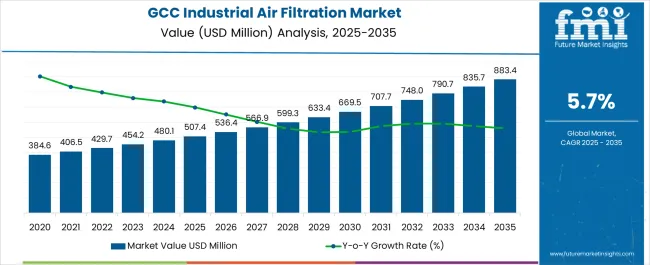
| Metric | Value |
|---|---|
| GCC Industrial Air Filtration Market Estimated Value in (2025 E) | USD 507.4 million |
| GCC Industrial Air Filtration Market Forecast Value in (2035 F) | USD 883.4 million |
| Forecast CAGR (2025 to 2035) | 5.7% |
The GCC industrial air filtration market is expanding steadily due to stringent emission control mandates, growing industrialization, and heightened focus on worker health and equipment longevity. Regulatory compliance across heavy industries such as cement, chemicals, and metallurgy is reinforcing the need for robust filtration systems capable of managing fine particulate and hazardous air pollutants.
The push for cleaner indoor air environments within manufacturing facilities, combined with investments in smart factory infrastructures, is elevating the demand for integrated air filtration units. Additionally, increased adoption of energy-efficient filtration technologies, supported by corporate sustainability targets, is paving the way for widespread deployment.
Market participants are investing in localized manufacturing and service networks to meet rapid turnaround requirements and ensure system uptime in high-dust industrial environments. Over the forecast period, rising capital investments in infrastructure and energy-intensive sectors are expected to catalyze demand for advanced air pollution control solutions across the GCC.
The market is segmented by Product Type and Application and region. By Product Type, the market is divided into Dust Collectors, Baghouse Filters, Odour Control Units, and Paint & blasting booth Filters. In terms of Application, the market is classified into Cement, Food, Metals, Power, Pharmaceuticals, and Others. Regionally, the market is classified into North America, Latin America, Western Europe, Eastern Europe, Balkan & Baltic Countries, Russia & Belarus, Central Asia, East Asia, South Asia & Pacific, and the Middle East & Africa.
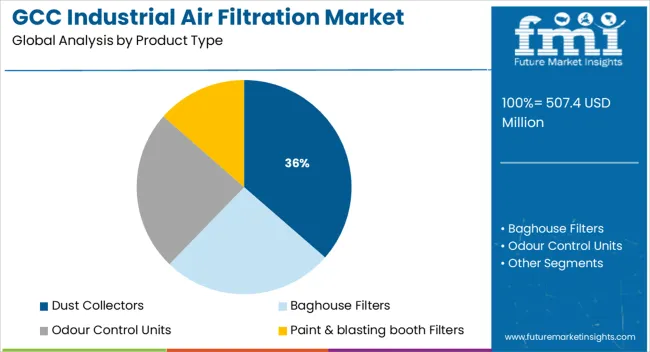
Dust collectors are anticipated to account for 36.4% of the total market revenue in 2025, establishing themselves as the dominant product type in the GCC industrial air filtration market. Their leadership is being driven by their proven efficacy in capturing airborne particulates across a range of industrial processes, particularly in cement, metalworking, and petrochemical operations.
The ability to maintain air quality and protect both personnel and sensitive equipment in high-dust environments has positioned dust collectors as a standard requirement in production plants. Additionally, innovations in modular and cartridge-based systems have enhanced ease of maintenance and reduced operational downtime.
Increasing energy-efficiency standards and the shift toward centralized air filtration have further propelled their deployment in large-scale facilities, where continuous dust mitigation is essential for regulatory and operational compliance.
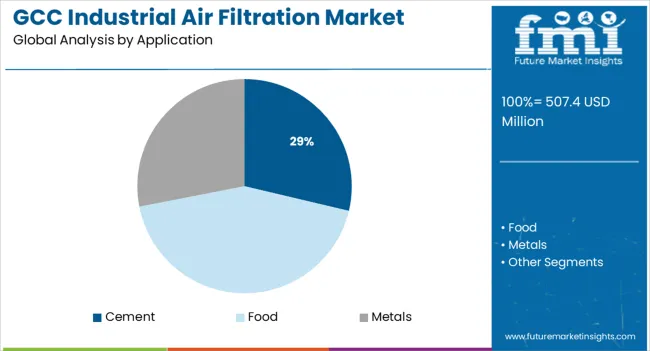
The cement industry is projected to contribute 28.7% of the GCC industrial air filtration market revenue in 2025, making it the leading application segment. This dominance is being influenced by the sector’s inherently high dust generation and the mandatory need for air pollution control technologies in compliance with regional environmental standards.
Cement manufacturing processes such as kiln operations, grinding, and material handling emit fine particulate matter, necessitating continuous filtration solutions. Regulatory enforcement by municipal and national environmental authorities has pushed manufacturers to upgrade or retrofit existing systems with high-efficiency filters and automated monitoring mechanisms.
The increasing number of greenfield and brownfield projects in infrastructure and construction sectors across the GCC is amplifying the demand for cement, thereby driving further filtration system investments aimed at ensuring uninterrupted production and emission compliance.
As per FMI analysis, the demand for GCC Industrial Air Filtration Market is anticipated to grow by USD 480.1 Million in 2024, the industrial air Filtration is anticipated to grow at 2.7% CAGR by value between 2020 and 2024.
The GCC Industrial Air Filtration Market is projected to grow at a significant rate, owing to the increasing power industry, pharmaceutical industry, and cement industry. The increasing popularity of custom-built products amongst end users is creating a huge scope for R&D activities for manufacturers. The customized filtration system allows end users to choose the right products for their application according to various technical factors such as dust load and dust type. Due to such increasing demand, manufacturers have also focused on enhancing their offerings with customized products. The Industrial Air Filtration Market also owes some of its growth to increased investments in urban development and the expansion of manufacturing plants throughout GCC countries to support governments' initiative to shift the dependency of revenue generation from the Oil & Gas to the Industrial Sector. In countries like KSA and the UAE - where industrialization is gaining momentum - safety from air pollution continues to grow in popularity as more regulations are enacted to ensure worker safety.
Another force behind the ever-expanding market for industrial air filtration is the demand among customers for newer and better filtration systems. As the technology behind Industrial Air filtration improves, users of industrial air filtration trade up their equipment for newer models. New and improved technology leads to improved efficiency, better ease of use, and inclusive savings in operational costs. These qualities compel users of industrial air filtration to replace their machines regularly.
The growth of industrial air Filtration in the GCC market is anticipated to grow by 1.7x from 2025 to 2035
Bag-House Air Filtration Systems Gaining Popularity in the GCC Market
Carbon black, cement, insulation production, lime, metals and mining, and power all employ baghouses. Baghouses are available in a variety of fabrics and are frequently used in hot, high-temperature, and dry operations. The Gulf countries probably favor baghouse air filtration systems because of how simple they are to install, how effective they are financially, and how well they can handle large amounts of dust.
A number of sectors are in charge of producing dust particles as a result of increased consumption in several nations, including Saudi Arabia and the United Arab Emirates, which is further boosting the demand for baghouse filters. Depending on the type of particulate, the temperature of the gases entering the baghouse, and the gas constituents, bags are designed in a wide variety of fabrics and finishes.
Local Manufacturers are making partnerships & collaborating with raw material suppliers and filtration consumable suppliers
The local manufacturers present in the Gulf region are creating partnerships with raw material suppliers, housing unit manufacturers, and filter consumable manufacturers to create proper assembly lines under the name of their own brand. Due to this strategy, the market players have the advantage of offering more products.
The manufacturers in the present market are providing custom-built air filtration systems to the end users by designing the system according to the customer's application, which enhances their customer relationship and increases brand value in the market.
Increasing Governmental Policies for Industrial Indoor Pollution Levels
By heavily investing in a variety of clean and renewable energy sources and technologies, the UAE government hopes to achieve carbon emission-free status by the year 2050. The UAE government estimates that in 2020, 76% of PM10 pollutants were caused by industrial air pollution. The total emissions in the region are significantly influenced by a number of industries, including those in manufacturing, woodworking, cement, food & beverage, pharmaceuticals, and utility production, which drives up the need for air filters such as dust collectors and baghouse filters.
The removal of particle pollutants is aided by air filtration systems because of their different sizes and customized designs. The demand for air filtration is expected to increase throughout the anticipated period due to increased laws and regulations by the national governments in the GCC region.
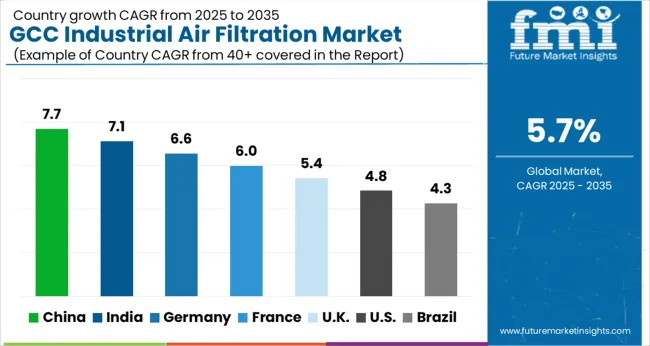
Saudi Arabia is set to create an absolute dollar opportunity worth USD 168.4 Million during the forecast period.
Saudi Arabia dominates the market for industrial air filtration in the GCC region. The growing investment in research and development by foreign companies in the country is leading to the growth of small and large-scale businesses in the country resulting in positively influencing the growth of the industrial air filtration market in Saudi Arabia.
The growing end-use industries such as food and beverage, pharma, power, etc. are stimulating the demand for industrial air filtration in the country. Moreover, Saudi Arabia is considered one of the largest producers of cement within the GCC countries. The growing demand for residential, commercial, and industrial construction is driving the growth of the cement industries, which is thereby driving the demand for industrial air filtration systems in cement manufacturing plants.
The UAE industrial air filtration market is expected to grow at a 6.1% CAGR during the forecast period, creating an absolute dollar opportunity worth USD 68.2 million.
According to the UAE Economic Vision 2035, industrial activity is increasing in the UAE to achieve sustainable economic diversification. By 2025, the UAE government is expecting to see the manufacturing sector's share of the total GDP rise from the present 11% to 25%. Accordingly, the manufacturing industry is expanding quickly. The UAE's oil and gas industry has helped the nation's economy flourish and has provided a significant investment to spend in manufacturing industries. Moreover, new industrial facilities have popped up all around recently, and foreign direct investments have also been welcomed in the country. As there has been significant growth in the manufacturing industry, the demand for industrial air filtration is also increasing in the UAE.
The application segment share varies in key markets; the chart above depicts an elaborated view of the application segment share by key market. Metal has a large stake, followed by food. By Country, Saudi Arabia has the highest share of the industrial air filtration market. The UAE has a significant share and is expected to grow at a steady rate during the forecast period.
By Product Type, odour control units will dominate the market through the forecast period and will account for more than 33.9% share on a value basis by 2035.
An odour nuisance can cause stress and can be harmful to humans. Without proper odour control, industrial odours can spread into surrounding areas and cause stakeholders to complain. The role that odour control units perform is crucial and necessary. Odour control systems capture and neutralise odour molecules to cover up offensive odours and eliminate them. The odour control units are designed to eliminate volatile organic compounds (VOC), and hazardous air pollutants (HAP), and to meet other odour regulations.
According to research, the food industry remains the most popular. The food industry is anticipated to remain dominant throughout the forecast period.
Increases in population, awareness of healthy eating habits, and increasing food consumption all contributed to the GCC food market's expansion. Consumption of organic and healthy food is expected to increase with growing awareness. Food production entirely depends on clean air. Contamination can only be reduced with regulated and monitored air quality. The use of filtration solutions with high efficiency provides maximum air hygiene and air quality compliance within the strictest standards and regulations.
The Food industry is set to grow with a CAGR of 6.9% and is estimated to create an absolute dollar opportunity worth USD 76.2 Million during the forecast period.
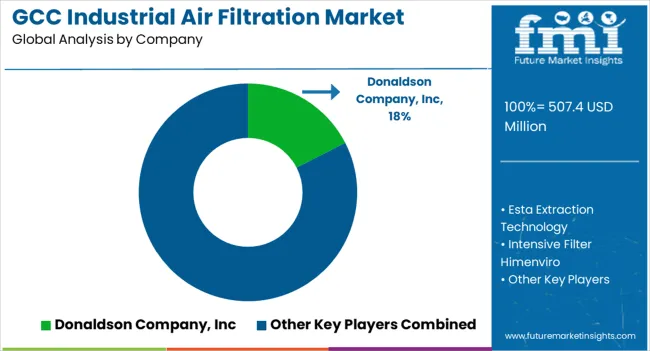
The GCC Industrial Air Filtration Market is gaining momentum with the presence of several big, medium, and small-scale system manufacturers, and service providers. Prominent industrial air Filtration manufacturers are collaborating and partnering with big manufacturers for better market opportunities.
| Attribute | Details |
|---|---|
| Forecast Period | 2025 to 2035 |
| Historical Data Available for | 2020 to 2024 |
| Market Analysis | USD Million for Value |
| Key Countries Covered | Saudi Arabia, UAE, Qatar, Kuwait, Oman, Bahrain |
| Key Market Segments Covered | By Product Type, By Application, and By Country |
| Key Companies Profiled | Esta Extraction Technology; Intensive Filter Himenviro; Wam Group; Tama Aernova; Absolent Air Care Group; Hanza Environment Technology Factory; CAMFIL GROUP; Donaldson Company, Inc; AGET Manufacturing; Filter Concept Pvt. Ltd |
| Report Coverage | Market Forecast, brand share analysis, competition intelligence, DROT analysis, Market Dynamics and Challenges, Strategic Growth Initiatives |
| Customization & Pricing | Available upon Request |
The global gcc industrial air filtration market is estimated to be valued at USD 507.4 million in 2025.
The market size for the gcc industrial air filtration market is projected to reach USD 883.4 million by 2035.
The gcc industrial air filtration market is expected to grow at a 5.7% CAGR between 2025 and 2035.
The key product types in gcc industrial air filtration market are dust collectors, baghouse filters, odour control units and paint & blasting booth filters.
In terms of application, cement segment to command 28.7% share in the gcc industrial air filtration market in 2025.






Full Research Suite comprises of:
Market outlook & trends analysis
Interviews & case studies
Strategic recommendations
Vendor profiles & capabilities analysis
5-year forecasts
8 regions and 60+ country-level data splits
Market segment data splits
12 months of continuous data updates
DELIVERED AS:
PDF EXCEL ONLINE
GCC Countries Halal Tourism Market Size and Share Forecast Outlook 2025 to 2035
GCC Adventure Tourism Market Size and Share Forecast Outlook 2025 to 2035
GCC Functional Food & Beverage Market Size and Share Forecast Outlook 2025 to 2035
GCC Natural Gas Market Size and Share Forecast Outlook 2025 to 2035
GCC Mini Cranes Market Size and Share Forecast Outlook 2025 to 2035
GCC Functional Food Market Analysis - Size, Share, and Forecast Outlook 2025 to 2035
GCC Medical Gloves Market Trends - Growth, Demand & Forecast 2025 to 2035
GCC Countries Coated Fabrics Market Size, Share, Trends, and Forecast 2025 to 2035
GCC Secondhand Apparel Market Growth, Trends and Forecast from 2025 to 2035
GCC Automotive Turbocharger Market Trends – Growth, Demand & Forecast 2025–2035
GCC Yeast Market Trends – Growth, Demand & Forecast 2025–2035
GCC Green and Bio-based Polyol Market Trends – Growth, Demand & Forecast 2025–2035
GCC Natural Food Color Market Growth – Trends, Demand & Innovations 2025–2035
GCC Barite Market Trends – Growth, Demand & Forecast 2025–2035
GCC 1,4-Diisopropylbenzene Market Report – Trends, Demand & Industry Forecast 2025–2035
GCC Yacht Charter Service Market Analysis – Trends & Forecast 2025 to 2035
GCC Flare Gas Recovery System Market Report – Trends, Demand & Industry Forecast 2025–2035
GCC Magnetic Separator Market Outlook – Growth, Trends & Forecast 2025-2035
GCC Electric Golf Cart Market Outlook – Demand, Growth & Forecast 2025-2035
GCC Active Spoiler Market Trends – Growth, Demand & Outlook 2025-2035

Thank you!
You will receive an email from our Business Development Manager. Please be sure to check your SPAM/JUNK folder too.
Chat With
MaRIA